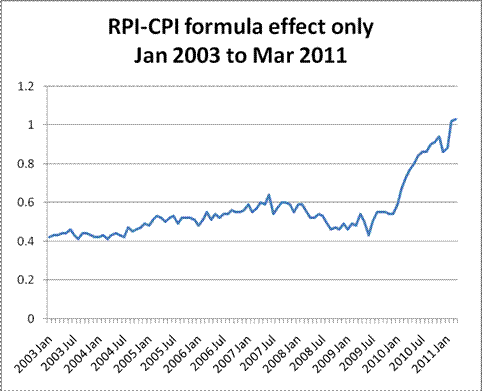
People are coping with inflation by buying cheaper items or buying fewer of the things they want. This human reaction to inflation is accounted for in one measure of inflation but not the other. The older Retail Prices Index (RPI) and the newer Consumer Prices Index (CPI) use different formulas for calculating the average of the 180,000 prices that are collected every month by 300 agents. For those who remember their ‘O’-level maths the details are in the box. The CPI formula keeps the proportion of the money we spend on bananas the same which reflects the fact that we trade down when prices rise. RPI does not. The result is that CPI is almost always lower than RPI.
The RPI uses a simple average – add up all the prices for bananas and dived by however many there are. It is called technically the arithmetic mean. But the CPI uses a different average – called the geometric mean – multiply all the prices and then take what is called the nth root – ‘n’ is the number of prices collected. In five shops a single banana costs 14p, 18p, 20p, 40p, and 63p. The RPI would call the average price 31p. The CPI would call it 26.3p.

As inflation grows the formula effect is rising. Normally it accounts for about 0.5 percentage points between the two indexes. But over the last two years as inflation has taken off that difference has doubled. In March the RPI was 5.3% and the CPI was 4%. That difference of 1.3 was made up of 0.3 due to housing costs and 1.0 due to the formula effect. The doubling of the formula effect shows we are trading down as inflation bites.
Because CPI is nearly always lower than RPI the Government now uses CPI for increasing most benefits – including part of the state pension – and public sector pensions. And it uses the RPI when it comes to raising the tax on things such as alcohol and petrol.
ANNUITIES BEST FOR
MOST
From April no-one is being forced to buy an annuity with the money
they have saved up for their pension. But research by the Pensions Policy
Institute has found that for the vast majority of us buying an annuity will be
the only practical choice. There are two alternatives to buying an annuity.
Capped Drawdown allows you to keep
your pension pot invested and withdraw money each year as long as it is no more
than you would get out of a flatrate annuity.
Flexible Drawdown allows you to take
what you like out of it each year as long as you already have a guaranteed
annual income of at least £20,000 from other pension arrangements.
The PPI found that around 700,000 people would have the guaranteed income needed for Flexible Drawdown but only around 200,000 would have a sufficient pension pot left to take advantage of it. It found that another 700,000 might have sufficiently large pension pots – above £100,000 – to take advantage of Capped Drawdown. If your pot is below that no Independent Financial Adviser will normally suggest you use capped drawdown – there are ongoing charges which you avoid by taking out an annuity. And an annuity gives you a guaranteed income for life whereas with capped drawdown you decide your income but there is no guarantee that your pension pot will last as long as you do.
Altogether the PPI estimates that around 7% of those between 55 and 75 can take advantage of the new rules. So there is a choice. But only for the wealthiest.
More information: PPI report http://bit.ly/fW31ij (big pdf).
NEW PENSION
PLANS
The Government has now published its plans to
change the state pension age. But do not get too excited. The changes will not
apply to anyone who reached pension age by the time the new system begins. That
will be April 2016 at the very earliest. So men born before 6 April 1951 and
women born before 6 April 1953 will be excluded from the new system and will
continue to get the pension they get now.
If you already get pension credit to top up your income the Government has said that will also continue exactly as it is now. But younger people who become entitled to the new state pension will be entitled to less pension credit.
However, there are changes planned to council tax benefit from April 2013 which will affect everyone and could see the help given with council tax reduced.
INHERITANCE TAX
The level at
which Inheritance Tax starts will be £325,000 for all deaths that occur up to 5
April 2015. That could see the number of estates paying IHT creep up from the
16,000 expected to pay it in 2010/11. But 97 out of 100 estates will still not
pay IHT. If you are married (or a civil partner) it is best to leave everything
to your partner. On the second death your heirs can then inherit double the
amount free of IHT – a total of £650,000.
To reduce the IHT bill give away up to £3000 a year or surplus income that you do not spend. Neither counts towards IHT arithmetic. And any gift is free of IHT if you live for seven years.